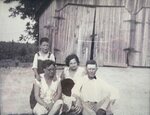

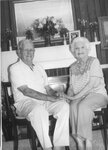
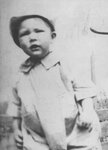

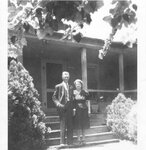
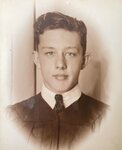


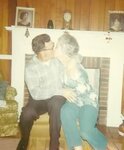
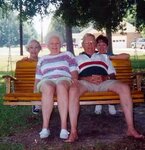
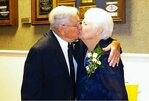
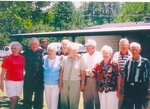
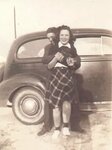
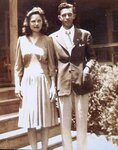
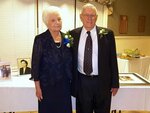

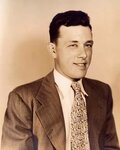
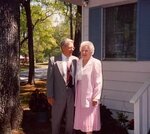
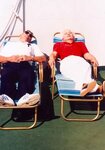








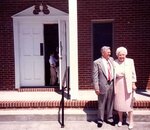
If you live to be 100, are you going to look back on your life and be happy with the way it all turned out? What regrets will affect you the most? What substantial moments and experiences will become the life-defining stories you share with your children and grandkids? If we’re lucky we get 70 years. If we’re truly blessed, we get 100. Still, however, there’s never enough time. It goes by too fast, and eventually, we all become the stories we leave behind. Our belongings make their way to the dump and the money we’ve left, runs out. The one thing that remains, though, are the memories, the adventures, and the love we provided for others. Because, when we leave this world, we leave it with our actions, and that, my friend, is what’s most important.
A few weeks ago, I met a man filled with so much wisdom and truth. His name is Mr. James Allen Flanders and on August 10, he celebrates 100 years of life. As he shared his beautifully authentic stories of love, loss, and new beginnings, I was humbled by his endless enthusiasm and fondness for others; reminding me to take a moment each day to slow down and search for the good and the beauty in the world, because it exists in every heartbreaking situation and in every space.
This is the story of James Allen Flanders, as told by him:
“Why don’t we start at the beginning?” Allen said with a smile. “I was born in 1923 in Emanuel County, of course. Born in a house right off of Highway 1 about a mile and a half above Dellwood. Dr. Dess Smith brought me into this world. I was the seventh child of 11. Though, I don’t really know what it was like to grow up in a big family and I’ll tell you why… When I was 18 months old, my mother became very sick. They took her to Savannah for an operation and took me to the old family homeplace where my grandmother, aunt and uncle lived. I was raised there in that house.”
He continued explaining, “At the time there were seven of us children then; J.C., Edward Mason, Arthur, Jordan Estus ‘Preacher,’ Virginia, Dorothy, and me, Allen. They farmed us all out; you know, like they used to; and kept us until Momma got well and got to come back home. When my momma came home, my grandma didn’t want me to go back, and to be honest, I wouldn’t go back, that became my home. So, I was raised right on Highway 1, one mile north of Dellwood at the old John Allen Flanders place. John C. Sumner owned it then. It was a beautiful big old house that Grandpa built out of timber. It was five bedrooms, with a kitchen and dining room. It had a wrap-around front porch that was the length of the house, and it was painted yellow, trimmed in white. It was beautiful,” he said with a bright gaze in his eyes.
When asked about his childhood, Allen lamented, "I was raised there on that farm and loved it. There was a family that moved up there that my daddy had hired, and they had a little boy about my age, and him and me were big buddies!” he recalled with a smile. “His name was David Lee Sanders. There was a little Georgia-raised mule there that grandpa had that never did much of anything - except Daddy plowed the garden with it. Me and David would play with that mule all day. We’d hitch a sled to it and get it to pull us all over that place. We had a ball! The Sanders lived there on the farm for several years. The last time I saw David he was on a Greyhound Bus. He was going to the army and that was the last time I ever saw him,” he said solemnly, as he thought back to that day. “But gosh those memories we made were good ones. We played all the time. We would do small jobs together in the summertime when I wasn’t in school. We would do little odd jobs, you know that boys do, that Daddy had us to do… but we always had a ball.”
Allen was raised alongside his cousin Lula Mae; “In the meantime, when I was there, my uncle, Bird Allen, had a daughter named Lula that had been raised by my parents. She was about 17 years older than me and had gotten married to a man named Horris Kite who was from Kite, Georgia. He was driving a gasoline truck coming to Swainsboro from Savannah and had a wreck and it killed him. So, Lula came back home, and she really helped raise me. She was my sister.”
During this time, Allen recalled witnessing a historic moment in Emanuel County history.
“In 1928 or 1929, they started paving Highway 1. Highway 1 wasn’t paved at that time, and they used mule-drawn scoops with convicts to pave it. Captain Stanley was the Warden of this district at the time. He had a big lot here in Swainsboro with his bloodhound dogs and convicts. That road was paved with the hard work of Georgia convicts. I remember the dump trucks were white and the road machine was pulled with mules. There was a guy working on that road that Lula fell in love with, his name was J.C. Corbitt. They got married and moved to Blundell. He drove a steam roller that was run by steam, and he rolled the asphalt out smooth. I would get on that roller and ride to Blundell with him. I did that many times. But I watched that old road being built. At night they’d park those machines close to the house and I’d sneak out and go play on them.”
By the mid-1920s, the effects of the boll weevil, which first arrived in 1915, had ravaged Georgia’s cotton fields and further decreased small farmers’ prospects for making a living. Allen recalls the effect this had on his family’s farm and ultimately their lives.
“Once a week my aunt would take me up to momma Sally Mays and Daddy Hodges. She made sure that I saw my family and my brothers and sisters. In the meantime, during the depression and my momma getting sick; black seed cotton and boll weevil; my daddy lost his plantation. So, he moved back to Blundell. He had worked for Emanuel Farm Company since the very beginning. Except what time he owned that little farm. Daddy and Momma lived in Blundell, and I remember him telling me that they had gone to bed one night and he told Momma that everything they had was paid for, then before daylight came, he didn’t even have a change of clothes because it all burned up.”
The Great Depression hit the South, including Georgia, harder than some other regions of the country, and in fact only worsened an economic downturn that had begun in the state a decade earlier. Allen recalled the drastic toll this took on his family.
“Times got so hard during the depression that the kids felt like they had no choice but to get up and go to work,” he explained. “When they weren’t working in the fields, my older siblings went to school in Dellwood. Every morning they would hitch a ride on the mule to school.”
After his parents' home burned down and their family was forced to begin again, they relocated to a southern dream surrounded by wide, open spaces.
“Then they moved to a big old house in the middle of a field,” he said. “We called it ‘the field place’. Daddy lived there until 1938. In the meantime, he got a job working in the Commissary store with a man by the name of Mr. Scott. Mr. Scott would come by the house every morning in a buggy and pick Daddy up for work, and he and Daddy would run the commissary,”
In addition to that, his father was also an overseer of a large farm.
“There were around 16- or 17,000 acres on that farm. They had a big cotton gin and an evaporator that Daddy used to make syrup. During the Depression he moved into the Sally Hall place on the Ogeechee River up near Midville. The boys did the farming for a year or two and my baby brother was born up there. My daddy rode a little horse named Dolly to work,” he recounted with a smile.
Life of course isn't without tragedy. Living through the Depression took its toll, but Allen also had to endure the loss of his baby sister, Estelle, during one particularly severe winter.
“One year we experienced the coldest winter I ever remember throughout my life. It was a week in February and the cold was so harsh it turned everything to ice. Our baby sister, Estelle, was three months old and she got pneumonia. The road to Daddy's house was terrible and the doctors couldn’t get to her,” he paused, “and… she died. Momma was holding the baby and she looked at my daddy and said, ‘Hodge, she can’t breathe.’ So, Daddy took the baby and threw her up into his arms to try and make her breathe and she died in his arms. That’s the only one they ever lost. She’s buried in the Blundell cemetery,” Allen shared as tears filled his eyes.
Although life was filled with uncertainty, it was that which drew their family closer together.
“I was blessed with a big, happy, family,” he said with a smile. “In the summertime, they’d go and pick a washtub full of peas, and then when nightfall hit, they’d sit on the porch and start singing and shelling peas. You could hear them a mile away. We were one of the happiest families. Truly. I can’t remember a time that any of us ever fought.”
It was through their healthy and unconditional love that they instilled in Allen that gave him the opportunity to find his own.
“The most important part of the whole thing was when I met Myrtle Ruth Coleman in October of 1941,” he said as he reminisced. “First time I ever saw her, I just knew. I was just a crazy young man then. She was two and a half years older than me and was pretty settled and mature. I started running around when I was just a kid, back then you did. Flanders Peebles and I were like brothers. We ran together. We went out to Dutch Tavern one night, that was our stomping grounds back then; we were sitting out there that night; Flanders, and his girlfriend, Flora Mae, and Myrtle and myself. Myrtle and I went in for something and when we came back out, Flanders said, ‘Flora Mae and me are gonna get married,’ so me and Myrtle talked a little bit and we decided that we were gone get married too. That was a Saturday night. The next day, we got in the car, went to Twin City, and waited for Jot Flanders to get out of church. He was the County Ordinary at the time. We rode to his house and walked up and down the dirt road in front of his house, waiting for him to get there. When he showed up, we walked inside and Flanders and Flora Mae stood on one side of the fireplace and me and Myrtle stood on the other, and we had a double wedding. We were broke. Neither one of us had anything. Flanders ran a little filling station at that time, and I worked on the farm, so we had a 24-hour engagement. That was August of 1942, and I wouldn’t have changed that moment for anything.”
After their marriage, Allen’s brother, Preacher, helped him get him a job at the union camp, checking wood.
“Daddy worked trucks and I worked rail cars. I worked three shifts for two years and one of the guys that was on day shift came to me and said, ‘What about you going on day work and me taking the shift work?’ I said, ‘Sure!’, so I worked there as a wood checker until 1984. Then I was finally promoted to foreman. I worked a foreman's job for a year. Then I became assistant superintendent, and after a year working under that title, I became the Superintendent. I stayed there until I retired in 1986,” he explained.
As every young couple knows, starting out is difficult… and it was no different for Allen and Myrtle in the 1940s and 50s. Not long after beginning his job at the Union Camp, Allen and Myrtle decided to move to Savannah to be closer to his family and began living at Tattnall Homes Housing Authority Units. Early in World War II, the Housing Authority of Savannah, noting large influxes of workers coming to Savannah to build ships for the US military, recognized the need for large numbers of "War Housing" units or temporary housing. Allen and Myrtle resided in these units for two years until moving to Price Street. During this time, Allen’s brother, Preacher, won a $100 raffle at a grocery store and used that money to purchase land in a suburb called Woodlawn Terrace. It was this life-changing moment that not only revitalized Preacher’s life, but also initiated the American Dream that Allen and Myrtle were working so hard to obtain.
“One day when I was out there visiting Preacher, he told me that Mr. Griffin was building a house on the other end, so we went down to see Mr. Griffin, and the house he was working on was almost complete. So, I asked him how much I would need to put a down payment on the home. At the time I was making 99 and a half cents an hour. He said, ‘About a hundred dollars.’ I said, ‘Well how much you gotta have tonight?’ He said, ‘About five dollars.’ I looked at Preacher and asked him if he had five dollars," Allen recounted as he laughed. “He said ‘Yeah,’ so I went to the credit union the next day and borrowed $100.”
Allen recalled what those first few years were like as he and Myrtle built it into their forever home.
“When we moved down there, there was nothing but broom sage, marsh grass and rattlesnakes. Lord, there were rattlesnakes all over that place. I lived in that little house and bought the lot next to me for $395. In total I paid $4,950 for the house and $350 for the extra lot, and I’m still there. We moved there June 1 of 1950, and I’ve been there ever since.”
In September of 1943, Allen and Myrtle welcomed their first baby into the world, a daughter, who they named Gloria. Nine years later, in June of 1952, they welcomed their second child and youngest daughter, Patricia, who they called, ‘Pat.’ Allen and Myrtle lived a life of love that many can only imagine in their dreams. They shared 77 wonderful years together and made every single moment count.
“Myrtle and I had a wonderful life there. She was the light of my life,” he said with a soft smile. “Everything that went into that house, we did it together. We worked together good. I would honestly say that we never had a knock down drag out. I’m not saying that we didn’t get mad, but when we did one of us would walk off until we were in the right mindset to talk through it. We didn't fuss. We didn’t argue. We maintained that kind of relationship when we first started dating. One time she got mad when we were dating. We were with Flanders and Flora Mae, and I went into a store, and while I was in there she got out of the car and walked home,” he recalled with a laugh. “I don’t remember what it was she got mad about, but she did. That was one of the only times she ever got really, fighting, mad. I remember we built a party house on the back of my lot and Myrtle and me built that house together. Anything I did, she was right with me.”
Family has always been the bane of Allen and Myrtles existence, and from the love they shared for 77 years, they created a generation that provided them with four grandchildren, five great grandchildren, and four great-great grandchildren. When asked about what the most important thing is that Allen has learned throughout his life, he expressed to be tolerant and to try and love everybody.
“I guess one thing is tolerance of other people. My love for other people is vast. I don’t have an enemy in this world. I don’t know of anybody I dislike because I realized that nobody’s perfect and there’s some good in everybody. When you get to my stage of the game, what you leave here is important but where you’re going is what is most important. I won’t leave my daughters rich but I hope they’ll remember some of the things that I taught them. I hope that they’ll remember to be tolerant and to love everybody. I just want good for everybody.”
He asked me to remember family first, whoever that may be to me, because that’s what matters most in the end. He told me “100 years goes by in a blink. You're just living and enjoying it and that’s how you miss it.”
“I’ll put it this way, you know the old song, ‘Life is but a dream’? Well, it is. Life is nothing but a dream. It goes by so fast. You take a nap and wake up to a different scenario that you have to go through, that you’ll remember. That goes for the people too. They eventually all become memories and at my age that’s what you’re left with; the precious memories, proving that the dream was real. My wife was my life. No two ways about it. When we got married, she settled me downright quick. She was my life and when she died, that part of my life was gone. My children and my nephew have made it easier but if I leave you with any advice at all, it's this; Take advantage of the time you’re given with the people that you love most, but never take advantage of their time. You only get this go-round once and it's a short ride. When it's over, it’s truly over. Without being mushy, try to live life as full as you possibly can and try to love everybody. Life is great, life is wonderful, but it flies by so fast. Like I said, it’s like a dream. You look back and know you were there, and you did that, but in a flash, it's gone and becomes another memory.” He concluded.
His words resonated deeply with me. Our generation has it too easy. So easy that when times get tough, we run instead of work through it. We live too fast and die too young. We’re careless with our hearts and others too. We’re so consumed with ourselves that we don’t consider what’s truly important in this short amount of time that we’re given and furthermore - what’s not. I hope that if I make it to 100, I can look back on my life the same way that Mr. Allen Flanders does, with a smile. I hope that like him, I’ll have the grace to accept every card I was dealt, and that whatever good I’ve left here on this earth will spread like wildfire to each hopeful heart, long after I’m gone.
May we all live to see 100 and may we all live like James Allen Flanders.
Happy 100th Birthday Mr. Allen!